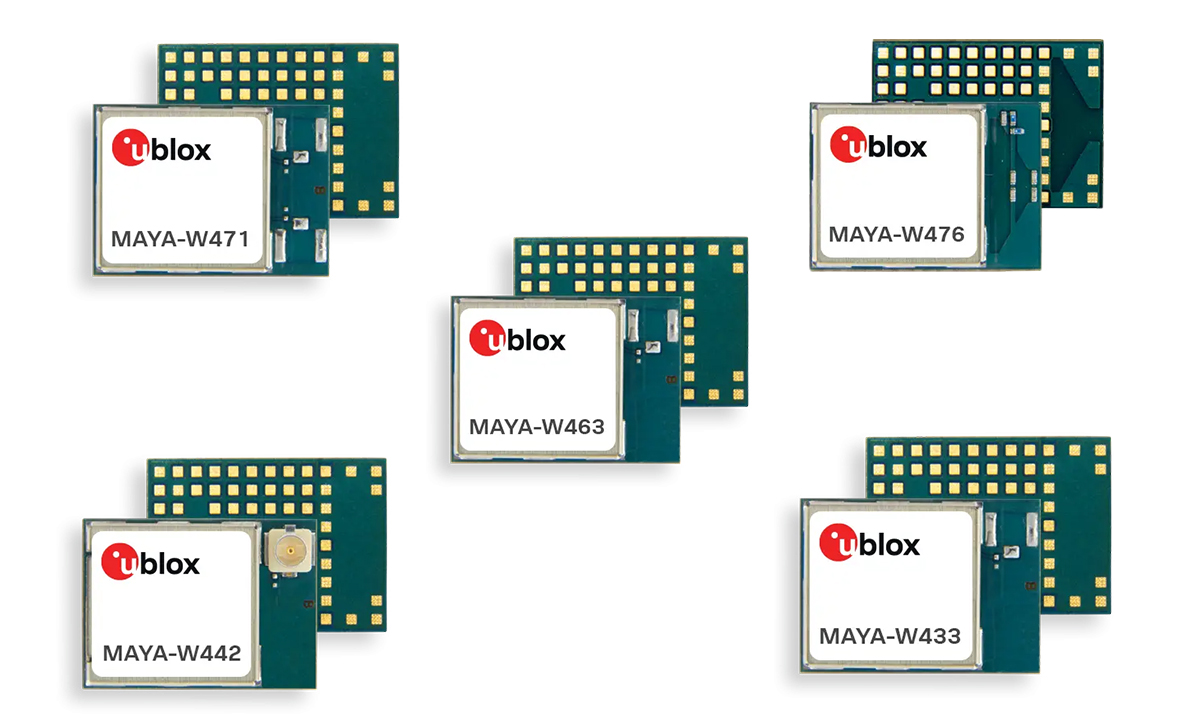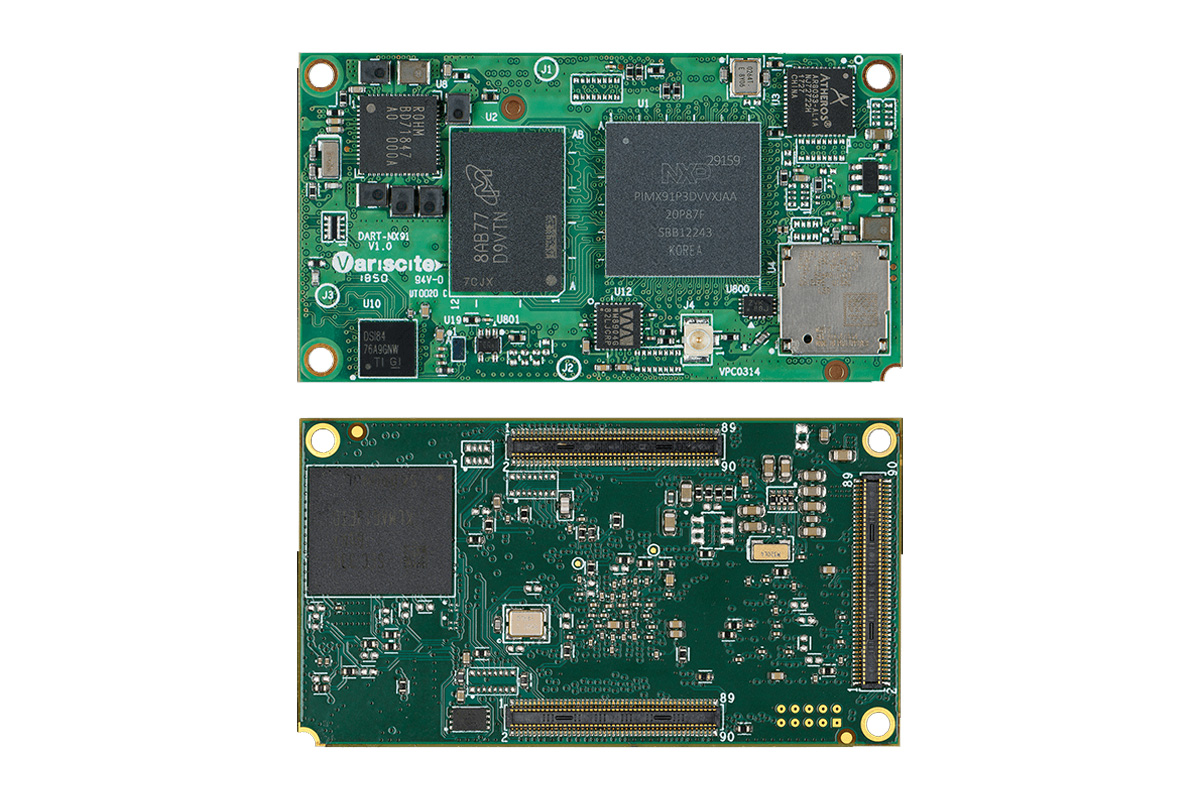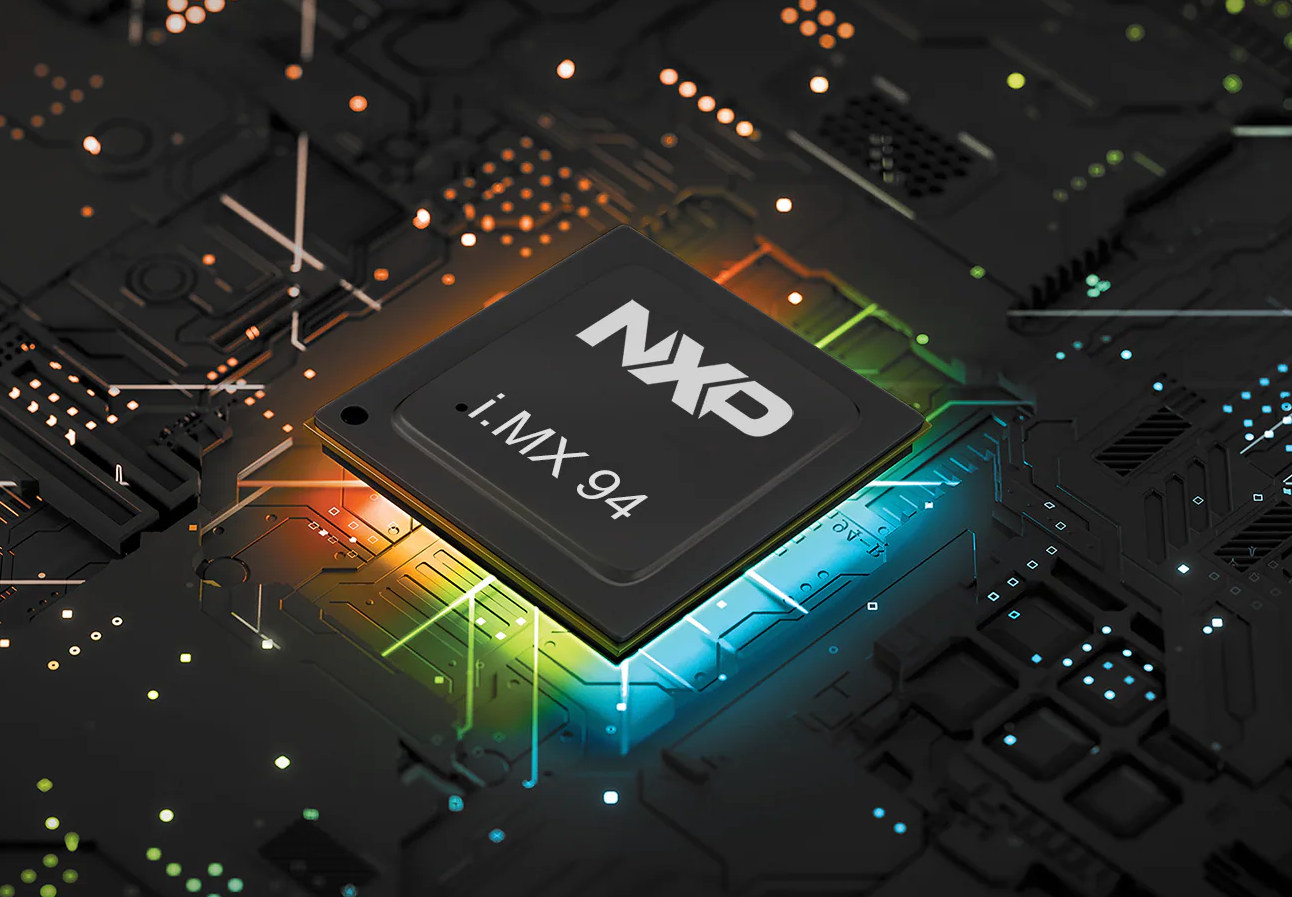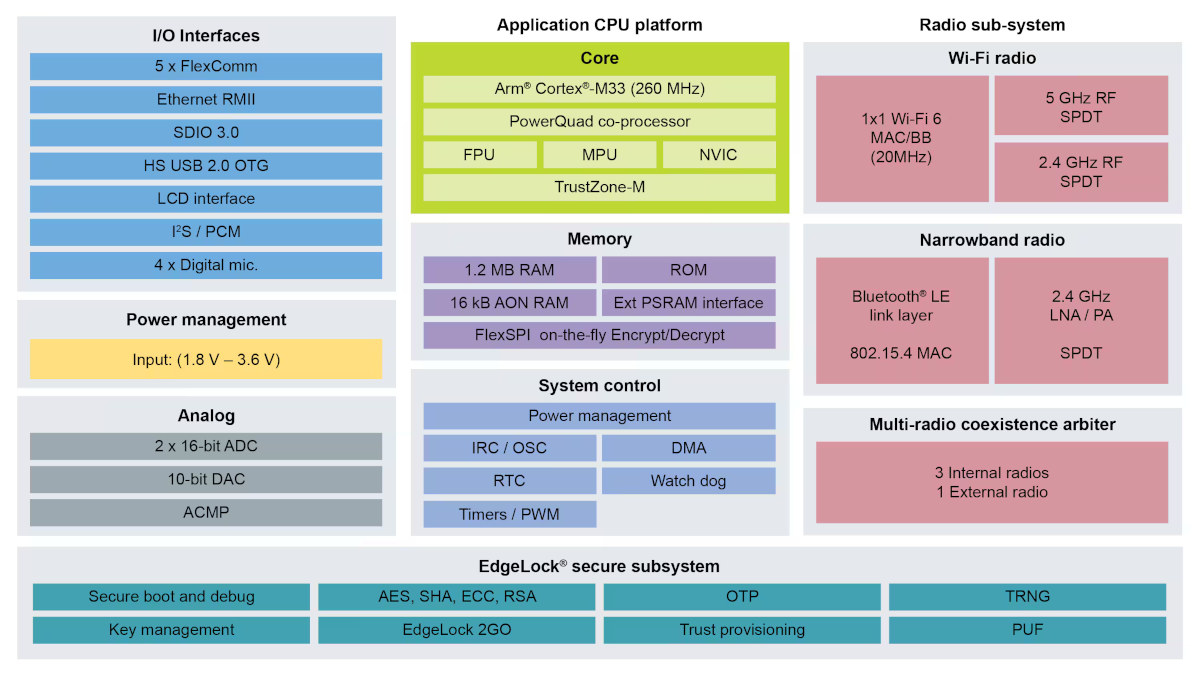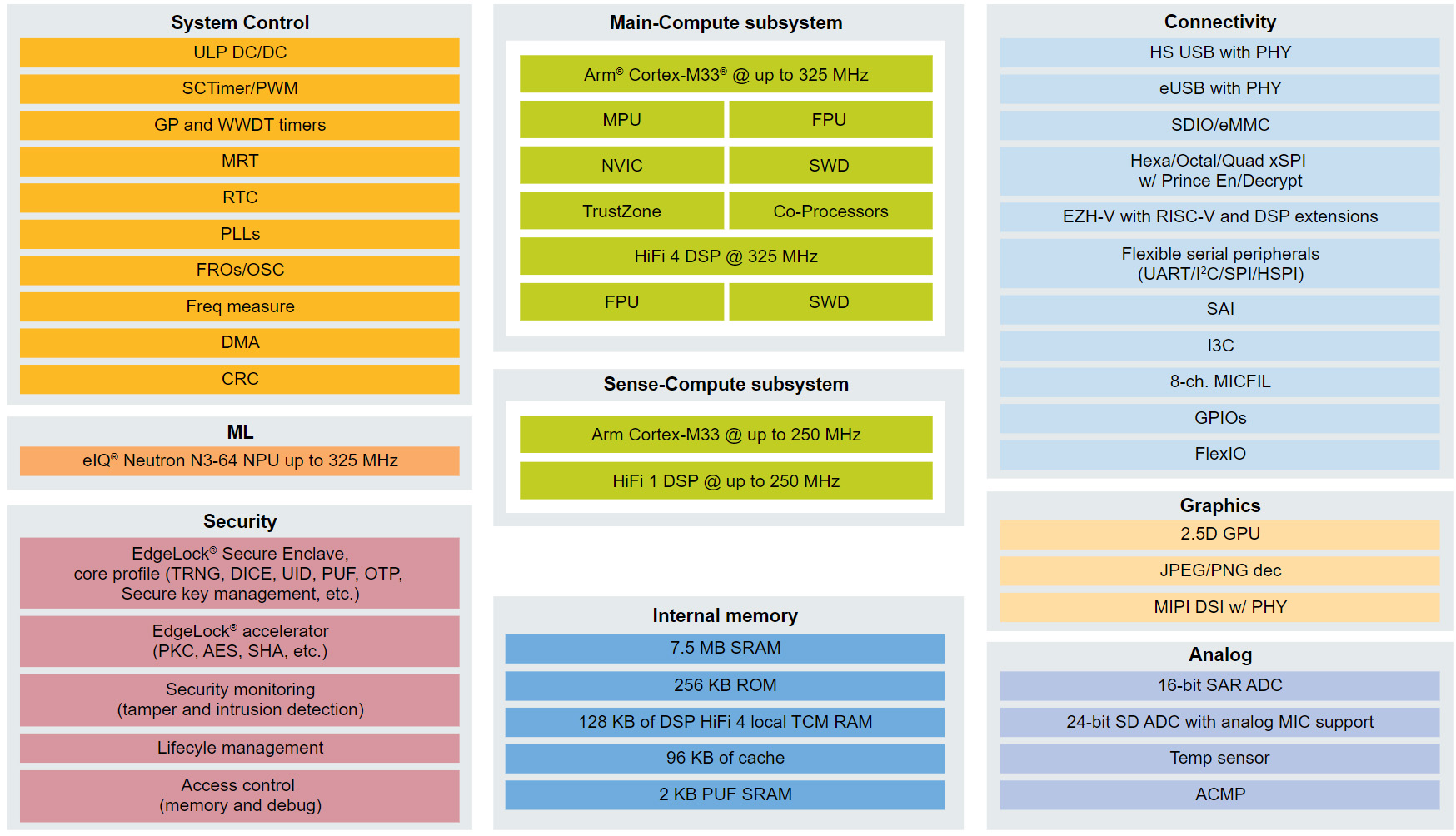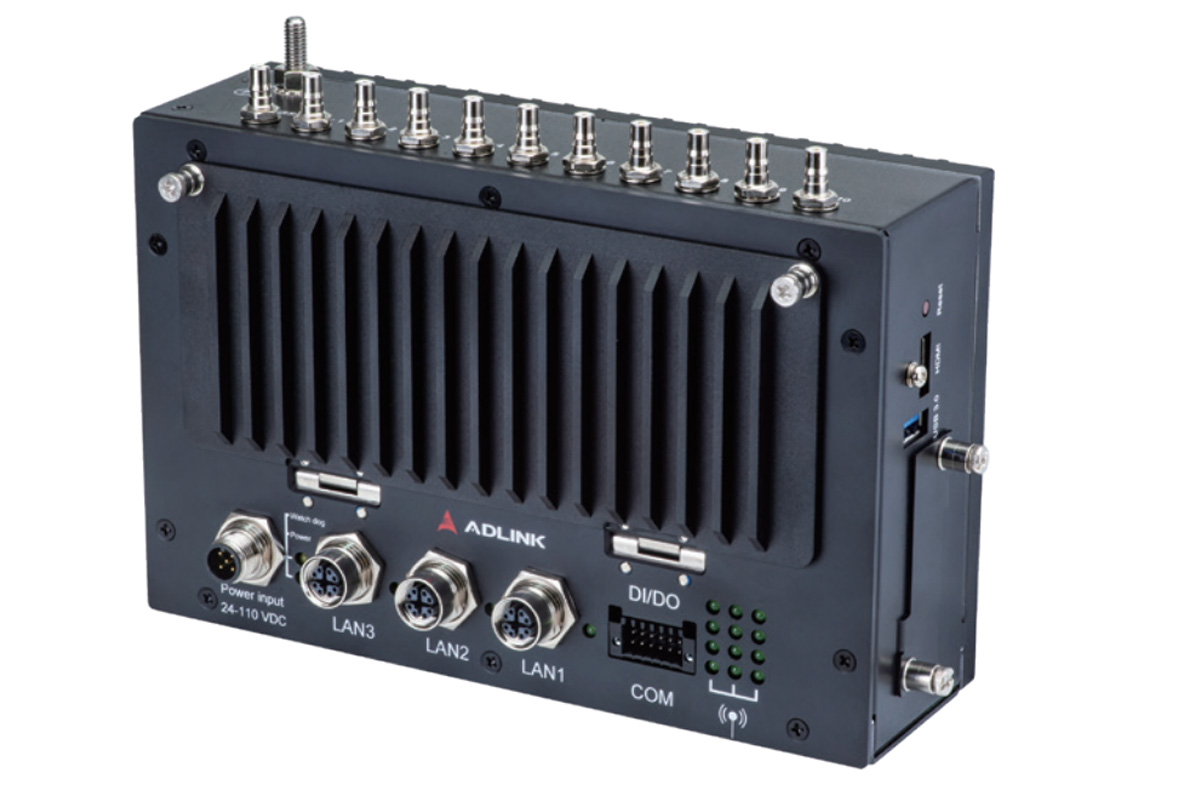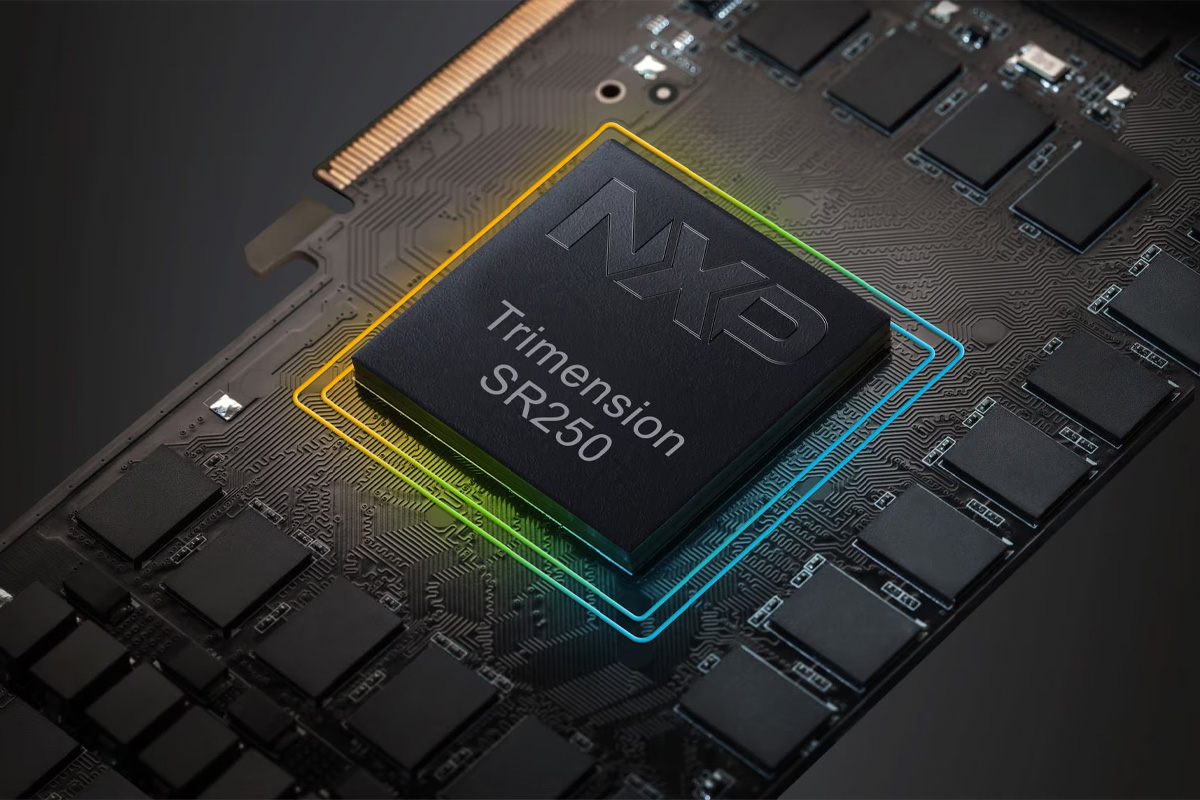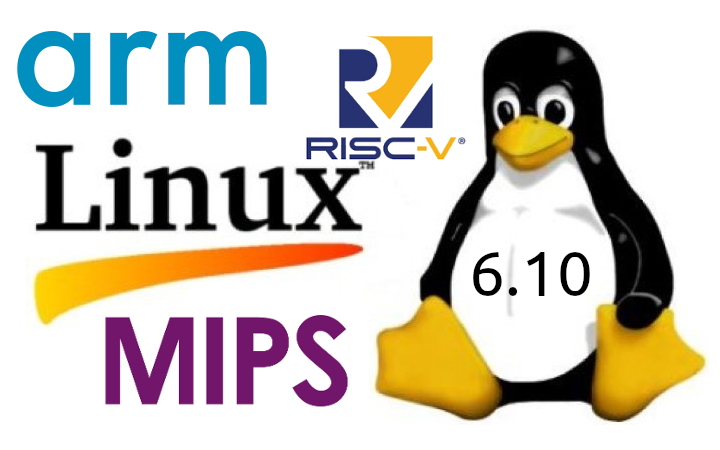Last year, we covered the u-blox MAYA-W3 module, which was based on the Infineon AIROC CYW5551x chipset and utilized separate chipsets for 2.4 GHz, 5 GHz, and 6 GHz frequencies. Now, u-blox has introduced the MAYA-W4 series, a host-based Wi-Fi 6, Bluetooth 5.4, and 802.15.4 module built on the NXP IW610 chipset. Designed for industrial and commercial applications such as building automation, energy management, smart homes, and healthcare, the MAYA-W4 series supports SISO Wi-Fi 6 with a 20 MHz channel width, ensuring reliable performance in dense network environments. These modules can function as access points, stations, P2P devices, or in mixed modes. The MAYA-W4 modules are compatible with the Matter protocol over Thread and Wi-Fi, facilitating seamless integration across ecosystems. With a compact size of 10.4 x 14.3 mm, these modules rank among the smallest Wi-Fi 6 SMD modules and are available with integrated antennas or U.FL connectors. Rigorous testing […]
Variscite DART-MX91 SoM offers dual GbE, WiFi 6, 15 years support
The Variscite DART-MX91 system-on-module (SoM) is a compact, cost-effective NXP i.MX 91 Arm Cortex-A55 module which is part of the DART Pin2Pin family already includes the DART-MX93 and DART-MX8M-PLUS among others. The SoM supports up to 2GB of LPDDR4 RAM and 8 to 128 GB of EMMC storage along with dual CAN-FD, dual Gigabit Ethernet, and dual USB interfaces. Wireless options include certified Wi-Fi 6, Bluetooth 5.4, and optional 802.15.4 for low-power wireless communication. Additionally, it supports three I2S audio interfaces, S/PDIF, and support for both digital and analog stereo mics along with 8-bit parallel camera interfaces and display with a capacitive touch controller. Variscite DART-MX91 SoM Specifications SoC – NXP i.MX91 single-core Cortex-A55 processor clocked at 1.4 GHz with 32 KB I-cache and D-cache, 256KB L2 cache (no 3D GPU) System Memory – Up to 2GB LPDDR4 Storage – 8 to 128GB eMMC flash Networking Qualcomm Atheros AR8033 Gigabit […]
NXP i.MX 94 octa-core Cortex-A55/M33/M7 processor targets Edge AI industrial and automotive applications
NXP i.MX 94 is an octa-core Arm SoC with up to four Cortex-A55 application cores, two Arm Cortex-M33 real-time/functional safety cores, two Arm Cortex-M7 real-time/functional safety cores, and an NXP eIQ Neutron NPU designed for Edge AI industrial and automotive applications I initially thought it would be a cost-down version of the NXP i.MX 95, and while it shares many of the same features, it’s more an application-specific processor designed specifically for industrial and automotive applications, lacking a 3D GPU, camera input interfaces, a MIPI DSI display interface, and 10GbE networking, but increasing the number of real-time cores (at the cost of application cores) and adding several networking features such as an Ethernet time-sensitive networking (TSN) switch, 2.5GbE interface, an Ethercat controller, and support for industrial protocols like Profinet or OPC-UA FX. NXP i.MX 94 specifications: CPU Up to 4x Arm Cortex-A55 cores 2x Arm Corex-M7 cores, one for functional […]
NXP RW612 Arm Cortex-M33 Wireless MCU offers Wi-Fi 6, Bluetooth 5.4, and 802.15.4 radios
The NXP RW612 is an Arm Cortex-M33 SoC with three radios, namely WiFi 6, Bluetooth 5.4, and 802.15.4 for Thread and Matter connectivity. It also has a small sibling called the RW610 without the 802.15.4 radio. I first came across RW61x chips, when Debashis wrote about the Trimension SR250 UWB chip mentioning it can work with “host processors like NXP’s i.MX, RW61x, and MCX families”. I initially thought it was a typo for the iW612 tri-radio solution introduced in 2022, and the RW612 is indeed similar, but it’s a complete wireless microcontroller/SoC with an Arm Cortex-M33 application core so it can be used independently as a host instead of a companion chip. NXP RW612 and RW610 specifications: MCU sub-system Core – 260 MHz Arm Cortex-M33 with TrustZone-M Memory On-chip 1.2 MB SRAM PSRAM interface for memory expansion Storage – Quad FlexSPI Flash XIP with on-the-fly decryption Peripheral interfaces Up to […]
NXP i.MX RT700 dual-core Cortex-M33 AI Crossover MCU includes eIQ Neutron NPU and DSPs
NXP has recently announced the release of NXP i.MX RT700 RT700 AI crossover MCU following the NXP i.MX RT600 series release in 2018 and the i.MX RT500 series introduction in 2021. The new i.MX RT700 Crossover MCU features two Cortex-M33 cores, a main core clocked at 325 MHz with a Tensilica HiFi 4 DSP and a secondary 250 MHz core with a low-power Tensilica HiFi 1 DSP for always-on sensing tasks. Additionally, it integrates a powerful eIQ Neutron NPU with an upgraded 7.5 MB of SRAM and a 2D GPU with a JPEG/PNG decoder. These features make this device suitable for applications including AR glasses, hearables, smartwatches, wristbands, and more. NXP i.MX RT700 specifications: Compute subsystems Main Compute Subsystem Cortex-M33 @ up to 325 MHz with Arm TrustZone, built-in Memory Protection Unit (MPU), a floating-point unit (FPU), a HiFi 4 DSP and supported by NVIC for interrupt handling and SWD […]
ADLINK AVA-1000 is a rugged EN50155-compliant T2G gateway for railway and industrial applications
The ADLINK AVA-1000 T2G gateway is a rugged, EN50155-compliant T2G (Train-to-Ground) gateway designed for railway and industrial environments. Powered by a choice of NXP i.MX8M Plus Quad Cortex-A53 processor or an Intel Processor N50 Alder Lake-N processor. The i.MX8M Plus model is equipped with up to 8GB LPDDR4 and a 64GB eMMC flash whereas the Alder Lake variant features up to 4GB LPDDR5 memory and a 32GB eMMC flash. In terms of connectivity, the gateway features three M12 GbE ports and supports a wide range of options including 5G, WiFi 6, and GNSS. The AVA-1000 T2G gateway’s fanless design, wide operating temperature range, and 24-110V DC input ensure reliable operation in industrial environments. Additionally, its compliance with EN50155 and other industrial standards makes it ideal for various industrial applications. AVA-1000 T2G gateway specifications System Processor (multiple options) NXP i.MX8M Plus quad-core Cortex-A53 processor @ up to 1.8 GHz with Cortex-M7 […]
NXP Trimension SR250 short-range UWB radar supports secure ranging for Smart Homes and Industrial IoT
NXP Semiconductors has recently introduced Trimension SR250 UWB radar, which NXP is calling the industry’s first single-chip solution that combines on-chip processing with short-range ultra-wideband (UWB) radar and secure UWB ranging. Operating at 6-8.5 GHz, the SR250 supports features like 3D angle-of-arrival (AoA), time difference of arrival (TDOA), and time of flight (ToF) measurements accurate to within ±5 cm. The integrated on-chip radar processing reduces power consumption, which increases efficiency and it can work with AI/ML algorithms on host processors like NXP’s i.MX, RW61x, and MCX families. The SR250 is supported by firmware, middleware, and sample applications, simplifying development and deployment. Applications for this device include smart home automation (e.g., turning devices on/off based on presence), secure access, and safety monitoring, as well as industrial uses such as worker tracking, collision avoidance, and danger zone detection. Trimension SR250 UWB radar specification 3D secure ranging Fully interoperable with IEEE 802.15.4z HRP […]
Linux 6.10 Release – Notable changes, Arm, RISC-V, and MIPS architectures
Linux Torvalds has announced the release of Linux 6.10 on LKML: So the final week was perhaps not quote as quiet as the preceding ones, which I don’t love – but it also wasn’t noisy enough to warrant an extra rc. And much of the noise this last week was bcachefs again (with netfs a close second), so it was all pretty compartmentalized. In fact, about a third of the patch for the last week was filesystem-related (there were also some btrfs latency fixes and other noise), which is unusual, but none of it looks particularly scary. Another third was drivers, and the rest is “random”. Anyway, this obviously means that the merge window for 6.11 opens up tomorrow. Let’s see how that goes, with much of Europe probably making ready for summer vacation. And the shortlog below is – as always – just the last week, not some kind […]


